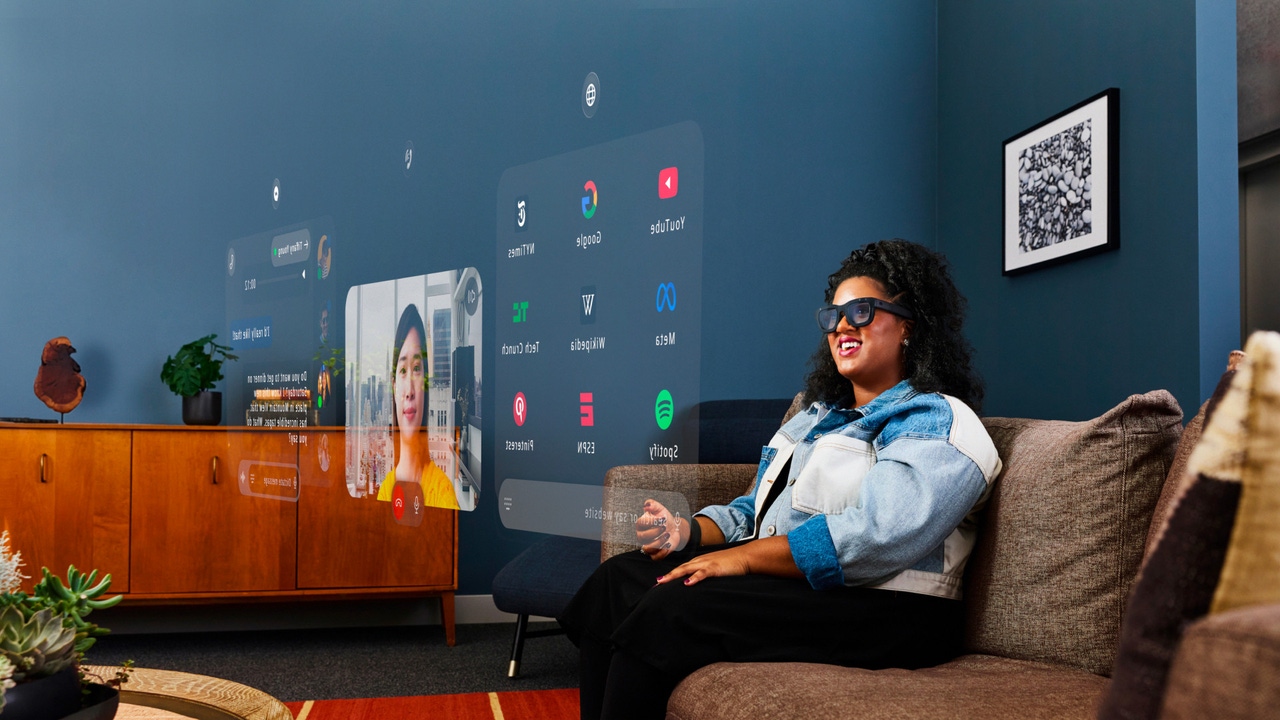Meta unveils its ‘first true’ AR glasses – but you can’t buy themMeta unveils its ‘first true’ AR glasses – but you can’t buy them
Social media/metaverse/AI tech giant Meta has unveiled Orion, which it reckons are the ‘most advanced pair of AR glasses ever made.’ However, it’s not going to make it into the hands of consumers in its current form.
September 26, 2024

Orion, formally codenamed Project Nazare, is a pair of augmented reality glasses which Meta distinguishes from its existing line of Ray-Ban Meta glasses by calling them ‘true’ AR glasses.
It has a holographic display and a personalized AI assistant, and seems to be the product of miniaturising some of the capabilities of more fully-fledged VR headsets like its own Meta Quest line and cramming it into a pair of, not exactly svelte but otherwise passable looking, pair of specs.
The release, in somewhat of a humble-brag, states: “Nailing the form factor, delivering holographic displays, developing compelling AR experiences, creating new human-computer interaction (HCI) paradigms – and doing it all in one cohesive product – is one of the most difficult challenges our industry has ever faced. It was so challenging that we thought we had less than a 10% chance of pulling it off successfully. Until now.”
Meta claims Orion has the largest field of view in the smallest AR glasses form, which unlocks ‘truly immersive use cases’. Examples of this are provided as multitasking windows, big-screen entertainment and life-size holograms of people. It has transparent lenses, as opposed to something like the Apple Vision Pro where what the wearer sees is entirely fed through from an array of cameras on the front of an opaque headset.

It runs Meta AI, which we’re told understands what you’re looking at and throws up useful visualizations – such as opening up your fridge and asking for a recipe based on what you’ve got in. Or you could ‘video call a friend while adjusting a digital family calendar as you wash the dishes’ – which sounds a needlessly stressful way of ticking off chores, but each to their own.
It can also be used to send hands free messages on WhatsApp and Messenger, Meta’s owned messaging platforms.
Sadly for those already eagerly reaching for their wallets, Orion itself isn’t actually going to hit the shelves.
“While Orion won’t make its way into the hands of consumers, make no mistake: this is not a research prototype. It’s one of the most polished product prototypes we’ve ever developed, and is truly representative of something that could ship to consumers. Rather than rushing to put it on shelves, we decided to focus on internal development first, which means we can keep building quickly and continue to push the boundaries of the technology, helping us arrive at an even better consumer product faster.”
Instead, Meta employees and ‘select external audiences’ will get their hands on it so development teams can work towards a consumer AR glasses product line, which it plans to begin shipping in the near future.
In the pursuit of this commercial release, Meta plans to work on tuning the AR display quality to make the visuals sharper, make the form factor smaller, and build at scale to make them more affordable, we’re told.
“In the next few years, you can expect to see new devices from us that build on our R&D efforts. Orion isn’t just a window into the future – it’s a look at the very real possibilities within reach today. From Ray-Ban Meta glasses to Orion, we’ve seen the good that can come from letting people stay more present and empowered in the physical world, while tapping into all that the digital world has to offer.”
Meta has also announced some updates to its existing AR/VR/MR gadgetry. The Meta Quest 3S is a cheaper version of its Quest 3 launched last year, starting at $299.99.
Usually when a budget version of a flagship bit of tech comes out there are component compromises. This one seems to be down to the fact Meta Quest 3 has four times the storage of the baseline Meta Quest 3S, plus a 4K+ Infinite display, ‘state-of-the-art’ pancake lenses and a wider field of view.
Meta also says it’s rebuilt Meta Horizon OS for spatial computing with better support for 2D apps like YouTube, Facebook and Instagram, added better spatial audio, improved Passthrough’s contrast and colour, and added a Travel Mode which is supposed to let you use it on the go.
“Quest 3S is a big step in making mixed reality more accessible, and we hope you’re as excited as we are about the future of this technology”, states the release.

Meanwhile, the Ray-Ban Meta glasses are getting new AI features. Users can now use them to record and send voice messages on WhatsApp and Messenger, get it to make the same meal suggestions based on ingredients in front of you as described with Orion, and there’s now integration with the Be My Eyes app which connects blind and low-vision people with volunteers who can talk someone through what’s in front of them. Soon the specs will be able to translate speech in real time as well, we’re told.

While all this no doubt is the product of a lot of heavy lifting and technical achievement – if nothing else in miniaturisation and AI integration – the VR market as a whole isn’t exactly setting the world on fire as yet. There was much anticipation of Apple’s entry into the market, since it has form revolutionising sectors by forging gadgets with mass-market appeal, but there have been reports this year that its Vision Pro haven’t been flying off the shelves either.
If the VR/MR/XR/AR market – and we could really do with some sort of catch-all phrase at this point – is ever going to take off in a proper mass market way, a cheaper and more subtle device could be the thing that tips the scale, and these do appear to be directions Meta is exploring with its various offerings.
About the Author
You May Also Like










.png?width=300&auto=webp&quality=80&disable=upscale)


_1.jpg?width=300&auto=webp&quality=80&disable=upscale)